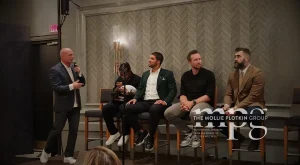Guest Post by Joshua Coleman, Ph.D. Learn More
“If you vote for Trump in the upcoming election, we are through.” Thus began a letter from a son to his Boomer parents. “I was somewhat willing to overlook your decision in the previous election, despite his divisive rhetoric. But, if you still fail to recognize the harm he represents, I cannot allow you to be around my children or my wife.”
Political disagreements within families are increasingly common. A 2016 Ipsos/Reuters poll found that 16% of people in the U.S. aren’t speaking to each other because of political differences.
Blood is no longer thicker than water, especially if that water is political affiliation.
As a psychologist specializing in family estrangement, I’ve seen political differences tear families apart. Psychologists have long understood that simply identifying with a group—no matter how small—can trigger a sense of division from others. According to a report by Pew, political identity has become the most powerful marker for determining who we associate with or reject, surpassing differences in race, age, gender, or religion.
Here are ten key strategies for approaching these difficult discussions:
- Dig deeper: Instead of focusing on how much you hate your family member’s politics, try to understand what draws them to their viewpoint. Is it the sense of belonging, the certainty of their leader, or a family tradition to vote along party lines. Their beliefs may reflect deeper personal conflicts or emotional needs. When you understand what motivates them, you’re more likely to fell empathy instead of frustration or contempt
- Don’t get into the right and wrong of it: You can’t change someone’s mind by proving them wrong. The goal is to be seen as an ally, not an opponent. If you become confrontational, they’ll only get defensive. Instead, show that you understand their perspective, even if it clashes with your own beliefs.
- Validate wherever you can. Say things like, “I hear what you’re saying” or “I know a lot of people share your view.” Respectful framing opens the door for the other person to reciprocate.
- Take timeouts: Make an agreement that if either person wants to exit the conversation-they can. Use the timeout to calm down and re-engage from a calmer place.
- Just don’t go there: Not every difference has to be litigated. Sometimes the best position is to avoid the discussion entirely.
- Repair it if you blew it: if you said something hurtful, apologize.
- Find shared values: Despite today’s polarized environment, there are still areas of agreement. According to a report by Pew, most Americans—regardless of political party—believe corporations have too much power, support raising taxes on the wealthy, and want the U.S. to maintain its global leadership. Younger Republicans, for instance, are more likely to acknowledge climate change, favor legalizing marijuana, and support racial equality than their older counterparts. These shared values may provide ways to find common ground in a discussion.
- Express your limits before getting together: “Looking forward to seeing you but I’m not up for any political debates since they rarely go well.” But also, give a warning about your limits. If your family member can’t be respectful, let them know that you’re going to exit the conversation and the situation if they persist.
- Deliver on the limit: If you’ve provided fair warning, then you have to do what you say you’re going to do.
- Reinforce the positive: remind your family member that you care about them and their happiness far more than you do the areas where you differ.







